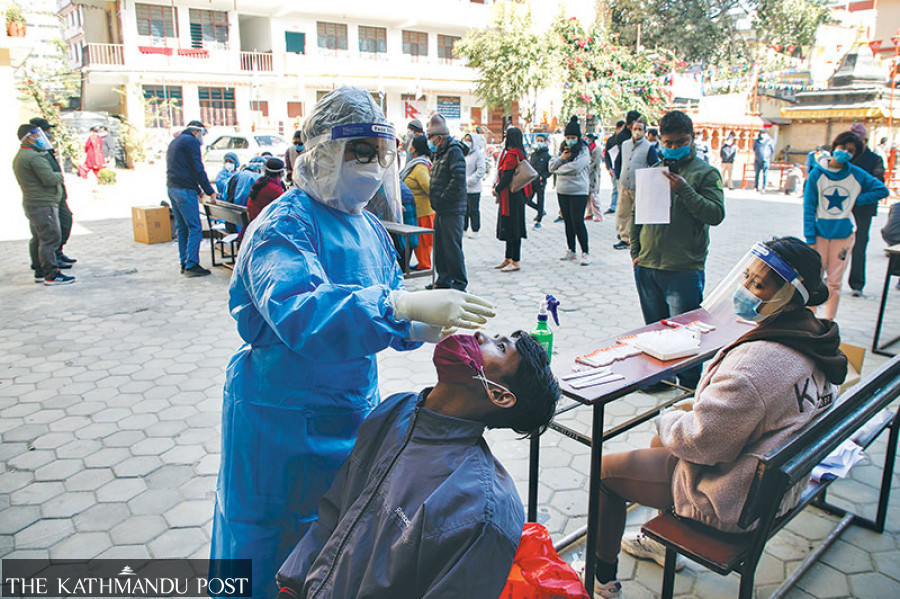Health
Large-scale study to assess population’s immunity to Covid-19 yet to start
Seroprevalence study examines presence of antibodies for a specific disease and helps authorities prepare strategies.
Arjun Poudel
In the first week of January, Dr Basudev Pandey, then director at the Epidemiology and Disease Control Division, was addressing the final meeting for deploying health workers to collect swab samples for a nation-wide seroprevalence study.
During the meeting, which was participated by officials and technicians, Pandey was handed a transfer letter sent by the Ministry of Health and Population.
“The meeting was concluded without any decision and later a nation-wide seroprevalence study, which was to be launched in the second week of January, was postponed indefinitely,” Pandey told the Post.
Experts say that the seroprevalence survey was necessary as it would provide data on the prevalence of coronavirus in communities, and help authorities prepare strategies for locating hotspots and taking necessary measures to contain the spread of the virus.
Such a study can also tell authorities how many people in a specific population may have contracted the virus.
However, the study has not started yet. Officials at the Epidemiology and Disease Control Division said that they are planning to start the study soon. But for that health workers need to be trained again, as all those trained earlier are not in contact.
“After completing the training we will start a nation-wide seroprevalence study,” an official at the division, told the Post, asking not to be named.
The Health Ministry had carried out a seroprevalence study in September last year with technical as well as financial support from the World Health Organisation. The study showed that around 14 percent of the country’s population may have been infected with the coronavirus by September last year.
And in some districts, the infection rate may have been as high as 28 percent, according to officials.
“The report indicated that 4 million of the total population could have been infected with the virus by September last year,” said Pandey, former director at the Division. “Officials at the Health Ministry did not let us disclose the report then and decided to carry out another large-scale study.”
The Health Ministry said that blood samples of 13,500 people from all districts will be collected and analysed at the National Public Health Laboratory.
“We are working to start another seroprevalence study at the earliest,” Dr Krishna Prasad Paudel, spokesperson for the Health ministry, told the Post. “We are planning to make the study more comprehensive. More samples will be collected from densely populated cities.”
According to Paudel, results of a large-scale seroprevalence study will help understand the immunity level against the coronavirus in the population, which ultimately helps in taking policy decisions including a decision to lift the restrictions.
Experts, however, said that large-scale seroprevalence studies should be carried out on a regular basis to know the infection and immunity status but taking decision on restrictions on the basis of immunity status could be another mistake.
“As the coronavirus has been constantly changing its form and there is no exact information on how long will the immunity after an infection last, taking decision on restrictions on the basis of one seroprevalence study will not be scientific,” Dr Megnath Dhimal, chief researcher at the Nepal Health Research Council, told the Post.
“Our southern neighbour had also performed a large-scale seroprevalence study in various cities including in Delhi and reported that over 50 percent of the population had antibodies against the virus but later those cities witnessed worst outbreaks.”
Dhimal said that the antibodies developed after vaccination are reliable and the only means to contain the spread of infections.
Other doctors say that seroprevalence study is a part of the measures that need to be taken on a regular basis to know the infection status, to make the infection control policy effective and focus the measures as well as resources in certain areas.
“Even if we do not know how long the antibodies will last, such studies give an idea of where the infection has spread and its intensity,” Dr Sher Bahadur Pun, chief of Clinical Research unit at Sukraraj Tropical and Infectious Disease Hospital, told the Post.
A seroprevalence study or a serology test examines the presence of antibodies for a specific disease in a population. When a human body is exposed to a foreign pathogen [disease-causing microorganisms], it produces antibodies in response.
Serology tests look for either immunoglobulin m (igm) or immunoglobulin g (igg), the two antibodies developed by the human body against a virus. The igm is the first antibody developed by the immune system, so it is detected in the bloodstream first, within a week or two, followed by the igg, which is detected only two weeks after the infection.
“Only the symptomatic people, those recommended by the doctors and people going abroad are getting serology tests,” said Pun. “Large scale seroprevalence study shows the extent of population infected with the virus so far, that will at least give some idea.”
Of late, infection rate has declined nationwide. Along with that, the number of tests for coronavirus have also declined.
On Wednesday, of the 8,687 polymerase chain reaction tests carried out throughout the country, 2,014 returned positive. The Health Ministry also performed 4,335 antigen tests which showed 814 people tested positive. In the last 24 hours, 52 people died throughout the country from the coronavirus infection.




 11.43°C Kathmandu
11.43°C Kathmandu















